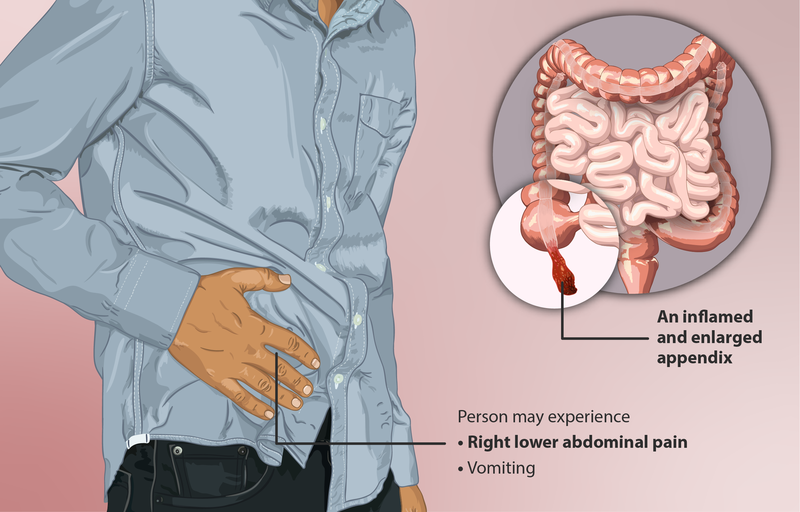This is a medical emergency that is triggered by a swelling or inflammation of your appendix. If you have appendicitis, you will experience pain on the right side of your abdomen and other symptoms which we would discuss shortly. In addition, when you are done reading this, you would be able to know how to prevent appendicitis and what to expect from your doctor if you have appendicitis.
Who can be at risk of appendicitis?
Although not very common, appendicitis affects 1 in every 1000 persons. The condition is common in people between ages 10 to 30, you are more at risk if you have a family history of appendicitis.
Causes of Appendicitis
Appendicitis can occur when there is a blockage at the opening where the appendix connects to the intestine. As a result of this blockage, bacteria begin to multiply in the appendix, building up pus and making the appendix swollen.
When you have an untreated digestive tract infection, it can lead to appendicitis.
Other conditions like Inflammatory bowel disease, abdominal injury and growth inside of the appendix can lead to appendicitis.
What are the symptoms of appendicitis?
The most common symptom of appendicitis is pain in your abdomen. This pain can start from your navel and move down-right of your abdomen. Depending on the state of the appendix, the pain could be worse and intensify by the day if the appendix bursts.
Other symptoms include;
- Vomiting.
- Fever and chills.
- Loose stool or constipation.
- Loss of appetite.
- Loss of weight.
- Abdominal bloating.
- Inability to pass gas.
If you experience any of the following symptoms it is time you see your healthcare provider. You can speak with us here.
How can appendicitis be diagnosed?
If your doctor suspects you have appendicitis, he may order one of the following tests to confirm appendicitis and also if your appendicitis has burst or not. The result from this test would determine the course of treatment you would undergo.
- CT – Scan: This scan gives the image of the internal organs, tissues and bones. This would provide your doctor with the image to understand the state of the appendix.
- MRI: This scan uses radio-wave and magnets to create images of your internal organs.
- Abdominal ultrasound: this uses high sound waves to produce images of your internal organs.
- Blood test: To show if there is an abdominal infection.
What are the ways to treat appendicitis?
If you are diagnosed with appendicitis there are three major ways that you would be treated.
- If it is a mild case, your doctor will prescribe an antibiotic course and closely monitor your improvement.
- In a case where your appendix has not ruptured, you would do a small procedure called Laparoscopic Procedure where a small incision is made and a camera (Laparoscope) is put inside your belly while the appendix is being removed.
- Traditional surgery can be done either when your appendix is ruptured or not. In both cases, antibiotics are given to treat infections while an anaesthetic is given during the procedure. The appendix is located and removed and if it has ruptured a small tube (shunt) is used to drain out the pus and any stomach fluid. Your doctor monitors you for a few days when he is satisfied that the pus is drained, he would remove the tube.
Can you live a normal life after your appendix is removed?
You can live normally without any need for a special diet if you undergo an appendectomy. The removal of your appendix does not in any way affect your quality of life and you do not need to be on a special diet after the procedure.
Complications from Appendicitis
- Peritonitis: When your appendix is inflamed and ruptures it leads to a stomach infection called peritonitis. Peritonitis if not treated immediately can be fatal.
Can appendicitis be prevented?
There is no known way to prevent appendicitis but maintaining a healthy diet would reduce your risk of having appendicitis.

